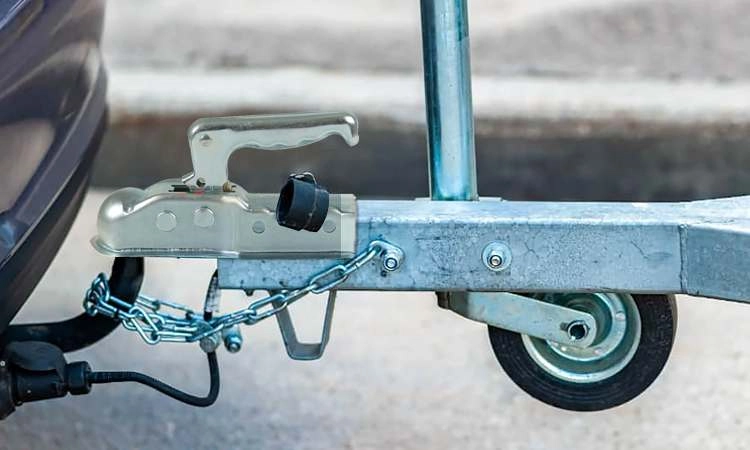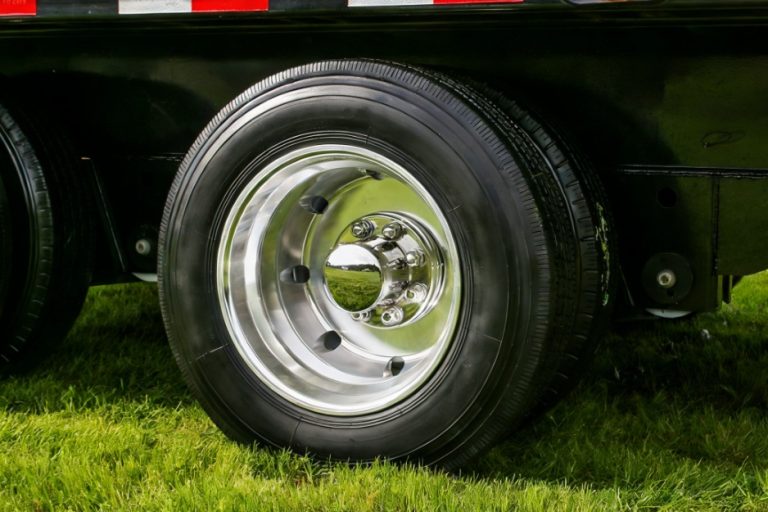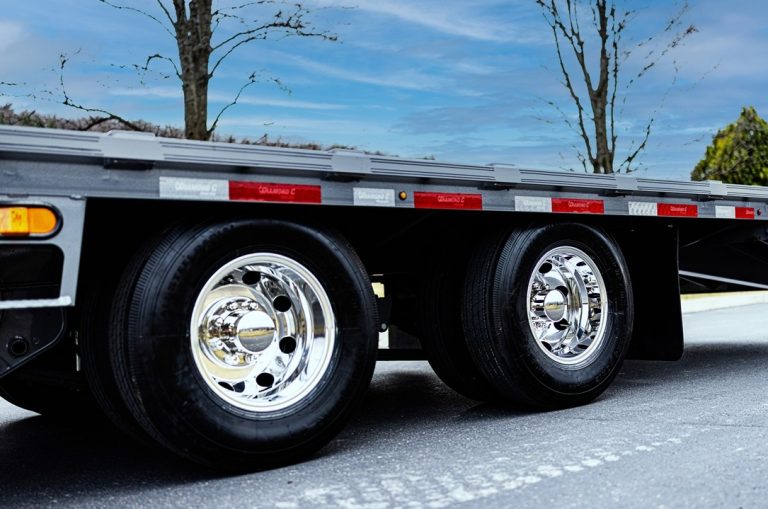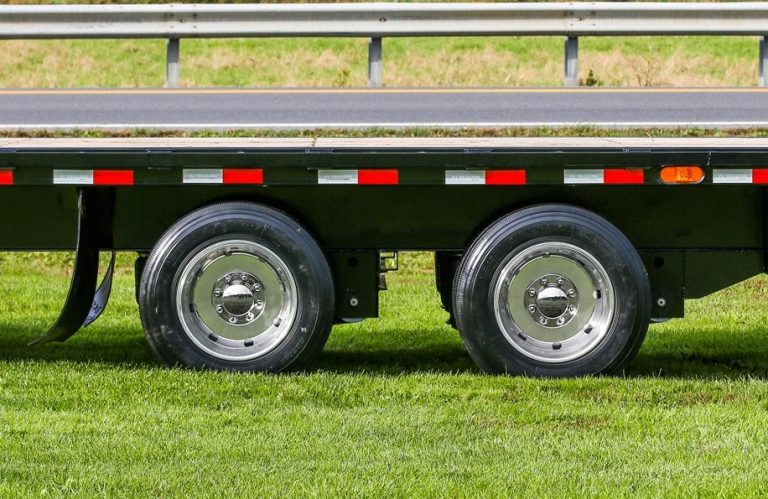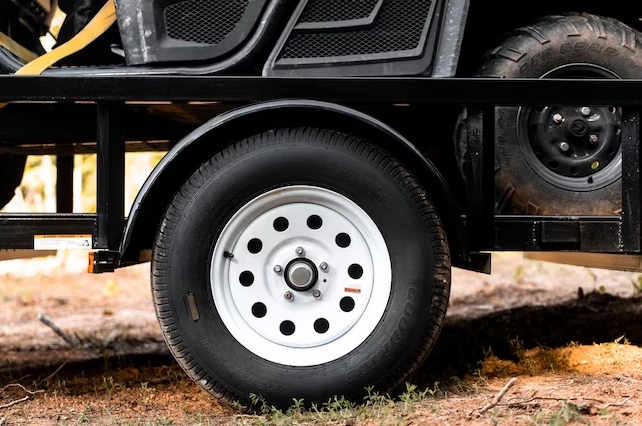يمكن أن تشعر بسحب مقطورة قاسية بالنسبة للأشخاص الجدد. مقرن المقطورة هو جزء رئيسي. ينضم إلى مقطورةك إلى سيارتك السحب. إن اختيار الشخص الصحيح يحافظ على السحب آمنًا وسلسًا. يشرح هذا الدليل أنواع مقرنات المقطورة، ماذا يفعلون ، وكيفية اختيار واحد لنا احتياجات السحب. ستتعلم الأساسيات وتشعر بالاستعداد لاختيار مقرنة لرحلاتك.
ما هي مقرنات المقطورة؟
مقرن المقطورة هو جهاز على لسان المقطورة. يتصل بكرة عوائق على سيارتك. يتيح هذا الرابط أن يتحول المقطورة بالسيارة أثناء البقاء آمنًا. مقرنات مقطورة تبقي السحب آمنة. يمنعون المقطورة من القدوم. بدون مقرنة جيدة ، قد تواجه التذبذب أو تعطل.
لماذا يهم مقرنات المقطورة؟
مقرنات المقطورة مهمة للغاية. هنا لماذا:
- أمان: مقرن قوي يمنع المقطورة من كسر الحرة.
- استقرار: المقرنة اليمنى تبقي المقطورة ثابتة ، حتى على الطرق الوعرة.
- ملائم: يجب أن تتطابق المقرنات مع لسان المقطورة وكرة عقبة السيارة.
- دعم الوزن: يتعامل مقرنات جيدة مع وزن المقطورة دون التشديد على السيارة.
معرفة أنواع مقرنات المقطورة يساعدك على اختيار الأفضل. دعونا نلقي نظرة على الأنواع الرئيسية المستخدمة في الولايات المتحدة.
الأنواع الرئيسية من مقرنات المقطورة
هناك العديد من أنواع مقرنات المقطورة. كل ما يناسب المقطورات والأوزان والوظائف المختلفة. أدناه ، نغطي أكثرها شيوعًا وميزاتها ومتى نستخدمها.
مقرنات الكرة
قارن الكرة تحظى بشعبية كبيرة في الولايات المتحدة. إنها بسيطة وتعمل في العديد من المقطورات. يتصلون بكرة عقبة ، عادةً 1-7 /8”,} 2 "، أو 2-5 /16” في الحجم. هذه رائعة للضوء إلى متوسط القطر.
ميزات مقرنات الكرة
- الوزن المحدد: يتعامل مع 2000 إلى 36000 جنيه ، بناءً على النموذج.
- مادة: مصنوعة من الفولاذ المختوم أو المصبوب ، وغالبا ما تكون مغلفة لتجنب الصدأ.
- المزلاج: استخدام المزالج المقصورة ، أو الأكمام ، أو المزالج الزناد للحصول على تعليق ضيق.
أفضل الاستخدامات
- مقطورات فائدة صغيرة
- مقطورات القوارب
- مقطورات البضائع الخفيفة
إيجابيات وسلبيات
| إيجابيات | سلبيات |
| بسيط للاستخدام | ليست كبيرة للأحمال الثقيلة الفائقة |
| رخيصة وسهلة العثور عليها | يمكن التمايل إذا لم يكن متطابقًا بشكل صحيح |
| يعمل مع كرات العوائق القياسية | يحتاج إلى التنظيف لوقف الصدأ |
مقرنات الكرة رائعة للمبتدئين. إنها سهلة الاستخدام. لكنهم ليسوا الأفضل للوظائف الكبيرة والثقيلة.
A-Frame jocpers
A-Frame jocpers قم بتركيب مقطورات مع لسان على شكل مثلث. إنها ثابتة وشائعة بالنسبة للمقطورات المتوسطة إلى الكبيرة.
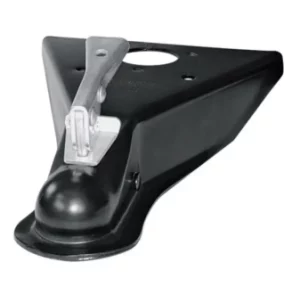
ميزات مقرنات الإطار A
- الوزن المحدد: يدعم 5000 إلى 21000 جنيه.
- تصميم: انسحب أو اللحام إلى الإطار A ، بزاوية 50 درجة لتناسب جيد.
- أمان: غالبًا ما يكون لديك مزلاج قفل أو الأكمام.
أفضل الاستخدامات
- مقطورات RV
- نولرات السيارات
- مقطورات فائدة متوسطة
إيجابيات وسلبيات
| إيجابيات | سلبيات |
| مستقر جدا للأشياء الأثقل | يمكن أن يجعل التصميم الكبير يتحول إلى صعبة |
| توقف مقطورة تمايل | ليس للأحمال الثقيلة الفائقة |
| صعب مع العناية | يحتاج إلى ملاءمة دقيقة مع إطار المقطورة |
مقرنات A-Frame صلبة لرحلات RV أو مقطورات العمل. أنها توازن القوة والسهولة.
قارن Gooseneck
مقرنات Gooseneck هي لسحب الثقيلة. إنهم يتصلون بكرة عقبة في سرير شاحنة صغيرة. إنها شائعة بالنسبة للبرو والقطر المرتبط بالعمل.
ميزات مقرنات groenseck
- الوزن المحدد: يتعامل مع 20،000 إلى 40،000 جنيه.
- تصميم: يحتوي على رمح على شكل أنبوب للحصول على رابط قوي إلى عوائق Groenseck.
- إضافات: غالبًا ما تستخدم مع الأنظمة لنشر الوزن بالتساوي.
أفضل الاستخدامات
- مقطورات الخيول
- مسطحة كبيرة
- مقطورات الماشية
- رحلات طويلة RV
إيجابيات وسلبيات
| إيجابيات | سلبيات |
| ثابت للغاية للأشياء الثقيلة | يحتاج إلى شاحنة مع عقبة السرير |
| يسمح المنعطفات الحادة | يكلف أكثر من الكرة أو الإطار A |
| يوفر المساحة في المقطورة | يمكن أن يكون الإعداد صعبًا |
المقرنات Groenseck رائعة لسحب الايجابيات عن الأشياء الثقيلة أو القيمة. أنها تعطي الدعم القوي والسيطرة.
أنواع أخرى من مقرنات المقطورة
تناسب بعض المقرنات الخاصة الاحتياجات الفريدة:
- مقرنات بنتل: بنيت لوظائف صعبة مثل الزراعة أو القطر العسكري. يتعاملون مع ما يصل إلى 60،000 جنيه. يستخدمون نظام ربط وحلقة ولكن يمكن أن يكونوا صاخبين.
- مقرنات قابلة للتعديل: دعك تغير الارتفاع للمركبات المختلفة. يتعاملون مع 5000 إلى 25000 جنيه. عظيم للأشخاص الذين لديهم مقطورات متعددة.
- Quickpin jocpers: استخدام دبوس واحد لربط سريع. من الأفضل للمقطورات الخفيفة إلى المتوسطة.
كل من هؤلاء أنواع مقرنات المقطورة لديه وظيفة خاصة. هناك واحد لكل مهمة سحب.
كيفية اختيار مقرنة المقطورة الصحيحة
اختيار مقرنة المقطورة ليس فقط عن النوع. تحتاج إلى التفكير في وزن مقطورة الخاص بك ، وشكل اللسان ، وحجم كرة العقار ، وما الذي تسحبه. إليك ما يجب مراعاته.
تطابق المقرنة مع لسان المقطورة الخاص بك
يقرر شكل اللسان نوع المقرنة:
- لسان مستقيم: استخدم مقرن مستقيم أو على غرار القناة.
- لسان الإطار: يحتاج إلى مقرنة A-Frame بزاوية 50 درجة.
- اللسان Groenseck: يتطلب مقرنة Groencheck لارتفاع سرير الشاحنة.
تحقق من الحد من الوزن
يجب أن يكون تصنيف وزن المقرنة أعلى من وزن المقطورة الإجمالي للمقطورة (GTW). وهذا يشمل المقطورة بالإضافة إلى تحميلها. اختر مقرنة بسعة إضافية للسلامة. على سبيل المثال:
- خفيفة: أقل من 2000 رطل (الفصل الأول)
- Medium-Duty: من 2000 إلى 8000 رطل (من الدرجة الثانية - III)
- الشقوق: أكثر من 8000 رطل (الفئة الرابعة - ف)
تحقق من Hitch Ball Fit
يجب أن تتطابق مقرنات المقطورة مع حجم كرة السيارة. الأحجام الشائعة هي:
- 1-7 /8”
- 2 "
- 2-5 /16”
- 3 "(نادر ، للسحب الثقيل)
يمكن أن يسبب الحجم الخاطئ سحب غير آمن. تحقق دائمًا من الملاءمة.
انظر إلى المواد والقوة
عادة ما تكون المقرنات من الصلب أو الحديد الزهر ، مع الطلاء لوقف الصدأ:
- المجلفن: توقف الصدأ ، رائع للمناطق الرطبة أو الشاطئية.
- مسحوق: يحمي من الشمس والماء ، يستمر طويلا.
- الحديد الزهر: قوي للمقاومات الثقيلة.
تحقق من ميزات السلامة
اختر المقرنات مع إضافات السلامة:
- أقفال: مزلاج أو أقفال دبوس تمنع المقطورة من القدوم.
- أنظمة الوزن: انتشار الوزن لتخفيف سلالة السيارة.
- السيطرة على التأثير: توقف مقطورة تمايل على الطرق الرياح.
فكر في سهولة الاستخدام
المبتدئين يحتاجون إلى مقرنات سهلة. بحث:
- أجزاء سريعة الإصدار
- مقابض السعاء سهلة
- أدلة إعداد واضحة
تساعدك هذه النصائح على اختيار مقرنة مقطورة لسحب آمن وسلس.
GO TRAILER: صانع قطع الغيار الخاص بك
هل تحتاج إلى مقرنات مقطورة الجودة؟ اذهب مقطورة هو الخيار الأعلى. لقد صنعوا أجزاء مقطورة لأكثر من 15 عامًا في تشينغداو ، الصين. تبني Go Trailer مقرنات صعبة ومصممة جيدًا لجميع أنواع القطر. يقاوم مقرنات الإطار المجلفن A-Frame و Tongue الطقس القاسي والاستخدام الكثيف. أنها تدوم طويلا وتعمل بشكل جيد. GO TRAILER تركيز على الجودة والأدلة البسيطة يجعلها رائعة للأبراج الجديدة والمحترفة.
في كثير من الأحيان أسئلة حول مقرنات المقطورة
س 1: ما هي الأنواع الرئيسية من مقرنات المقطورة؟
ج: الجزء العلوي أنواع مقرنات المقطورة هي مقرنات الكرة ، مقرنات الإطار A ، ومقاوم Groenseck. تعمل مقرنات الكرة للوظائف الخفيفة إلى المتوسطة ، مثل فائدة صغيرة أو مقطورات القوارب. تناسب مقرنات الإطار A-Frame مقطورات متوسطة إلى كبيرة ، مثل RVS ، وتبقيها ثابتة. مقرنات Groenseck هي للوظائف الثقيلة ، مثل مقطورات الخيول أو الماشية ، مع دعم كبير للوزن.
س 2: كيف يمكنني اختيار مقرنة المقطورة الصحيحة؟
ج: قم بمطابقة المقرنة مع شكل لسان المقطورة الخاص بك (مستقيم ، إطار ، أو gososeneck). تأكد من أن الحد الأقصى للوزن أعلى من وزن المقطورة الإجمالية للمقطورة (GTW). تأكد من أن المقرنة تناسب حجم كرة عقبة سيارتك ، مثل 2 "أو 2-5 /16”. هذا يحافظ على السحب آمنة وآمنة.
س 3: هل يمكنني استخدام مقرن مقطورة مع حجم كرة العاتين الخاطئ؟
ج: لا. حجم كرة عقبة غير متطابق أمر خطير. يجب أن يتناسب المقرنة بإحكام على كرة العوائق لتجنب التذبذب أو الضيق. الأحجام الشائعة هي 1-7 /8”, 2 "، و 2-5 /16”. تحقق من الحجم قبل القطر للبقاء في أمان.
س 4: ما هي ميزات السلامة التي تحتاجها مقرنات المقطورة؟
ج: ابحث عن مقرنات مقطورة مع أقفال ، مثل أنظمة المزلاج أو الدبوس ، لوقف غير المشروع. تساعد أنظمة الوزن والتحكم في التأثير في التوازن ، خاصة بالنسبة للمقطورات الكبيرة. يضيف طلاء مقاوم للصدأ ، مثل الجلفنة ، السلامة ويستمر لفترة أطول.
ابدأ القطر بثقة
هل أنت مستعد للسحب؟ اختيار مقرنة المقطورة الصحيحة يجعل الرحلات آمنة وممتعة. سواء كنت جديدًا وسحب مقطورة صغيرة أو محترفًا بأحمال ثقيلة ، مع العلم أنواع مقرنات مقطورة يساعد كثيرا. تحقق من لسانك ووزنه وسحبهم. ثم ، اختر مقرنة تناسب. مع مقرنة جيدة ، فإن القطر يبدو سهلاً وآمنًا. ابحث عن مقرنات عالية الجودة من صانعي الموثوقين وابدأ رحلة القطر اليوم!


